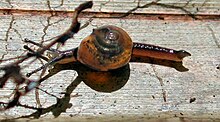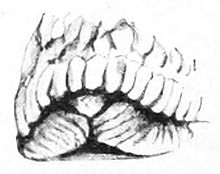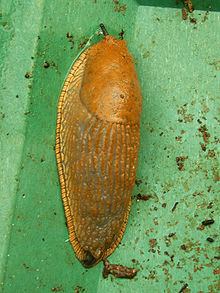The caudal mucous pit, or caudal mucous horn, is an anatomical structure on the tail end of the foot of various land snails and slugs, terrestrial pulmonate gastropod mollusks.





The function of this pit is the resorption of mucus when the gastropod is moving[1] (see also Muratov 1999).
An incorrect and yet often-used term for this structure is the "caudal gland".[1] This area also used to be referred to by the term "caudal pore".
Families
editFamilies of snails and slug where a caudal mucous pit exists in every species included:[1]
- Arionidae:
- Endodontidae
- Polygyridae
- Helicodiscidae
- Daudebardiinae (a subfamily of Oxychilidae)
- Urocyclidae
- Helicarionidae
- Ariophantidae
- Systrophiidae (Systrophiidae is a synonym for Scolodontinae, the subfamily of family Scolodontidae)
- Dyakiidae
Families/subfamilies where is caudal mucous pit exists only on some species included:[1]
- Ariopeltinae (a subfamily of Oopeltidae)
- Charopidae
- Binneyidae
- Ariolimacinae (a subfamily of Ariolimacidae)
- Anadenidae
- Trochomorphidae
- Helminthoglyptidae
- Ferussaciidae
- Subulinidae
- Euconulidae
- Zonitidae
- Vitreinae (Vitreinae is a synonym for Pristilomatidae)
- Gastrodontidae
References
edit- ^ a b c d Barker G. M. (2001) "Gastropods on Land: Phylogeny, Diversity and Adaptive Morphology." in Barker G. M. (ed.): "The biology of terrestrial molluscs". CABI Publishing, Oxon, UK, ISBN 0-85199-318-4. 1-146, cited pages: page 90 and pages 140-143.
Further reading
edit- Muratov I. V. (1999) "Analysis of the phylogenetic relationships and their systematic implications in the Limacoinei (=Zonitinia) infraorder (Gastropoda, Pulmonata, Geophila)". Ruthenica 9: 5-26.